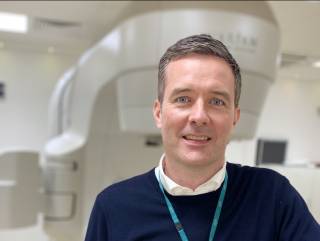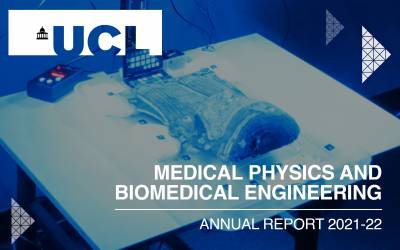
What inspired you to work in this field?
Therapeutic radiography is a brilliant mix of science, technical ability and patient care. The diverse skills needed to thrive in this role mean the work is always challenging and always rewarding. It’s a profession that never stands still and we are used to implementing constant technological advances and improvements. This endless cycle of change and progress means our problem-solving abilities are second to none. But for me, the real reward comes from interaction with patients and their families. Radiotherapy treatment is usually delivered daily and can last anything up to eight weeks, so we really get to know people well during their time with us. We help to guide them through what can often be some of the most challenging times of their life. I think this shared experience is what makes the job so special and so fulfilling.
How is Radiography impacting healthcare today?
A day rarely goes by without news reports of another ‘ground-breaking’ new treatment for cancer. This constant focus on innovation can sometimes overshadow the reality that for the majority of patients, radiotherapy and surgery offer the best outcomes. Radiotherapy is the workhorse of cancer care with nearly half of people receiving radiation treatment at some point in their pathway. Highly focused modern techniques mean we are successfully treating more people than ever. We are equipped with a vast array of tools including photons, protons, gamma rays, electrons and radioactive isotopes. This year has seen the opening of the UCLH Proton Beam Centre offering world-class treatment for paediatric, brain and head and neck cancers. Roles are also changing and expanding to meet the new challenges of a modern health service. We have consultant radiographers managing their own patient workloads, researchers focused on refining the latest techniques and advanced practitioners offering expert support in specialist roles.
What’s the most exciting development in the field?
There is growing recognition that the one-size-fits-all approach to care is no longer enough. Treatment and support are increasingly being tailored to individual patients. Radiotherapy delivery is adapted and modified from day-to-day, minute-to-minute and even second-to-second. Plans are modified and adjusted in real time to track tumour and organ movement. And sophisticated new imaging techniques allow us to visualise targets more precisely than ever. This commitment to personalised care is also being seen in the support we offer to patients before, during and after treatment. There is an increasing focus on prehabilitation, rehabilitation and the management of long-term side effects. Support services are growing and adapting to ensure that improvements in patient survival outcomes are matched by improvements in quality of life.
 Close
Close


